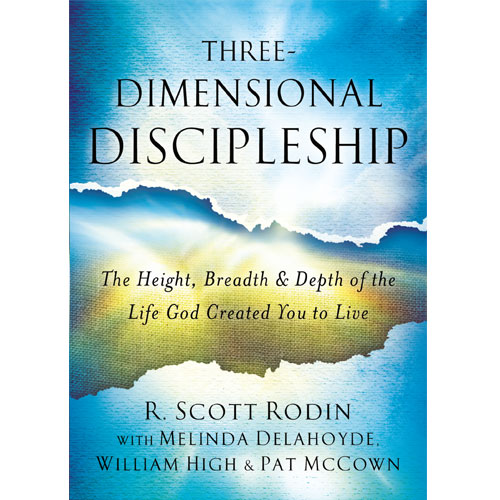Stewarding Brokenness
By Kelsey McFaul
Pastor Mark Foreman on children, adult-to-adult relationships, and the brokenness of the church

“There’s plenty of brokenness in the church.”
Mark Foreman admits that dysfunction in the pulpit, leadership, congregations, and the church’s public image has made him consider leaving the pastorate. But today, as lead pastor at North Coast Calvary Chapel in Carlsbad, CA, he is helping to create a culture for Christians to embrace their brokenness.
“When I say we value brokenness, I’m not saying let’s break everything. But it’s being vulnerable and admitting relationships in our lives are broken and facing it and not hiding it.”
In fact, Mark’s pursued specific graduate training to address brokenness, including an M. Div. in Theology, an M.Ed. in Counseling, and Ph.D. in Pastoral Care and Counseling. In his vocation as a pastor and a therapist, Mark is attune to the intersections between theology, therapy, and psychology, and also the ways churches struggle to acknowledge and integrate them.
“Oftentimes in church life, you only get one trip to the altar. The first time we celebrate your conversion; the second time we gossip about you, wondering what you did wrong. It creates a shame-based culture where people hide their brokenness.”
In contrast, North Coast and Mark seek to create a culture that celebrates vulnerability and brokenness. Being able to acknowledge broken relationships with God, ourselves, other people, and creation—the four aspects of steward theology—is the first step to admitting we need a Savior.
For Mark, the ideal context for acknowledging brokenness is in adult-to-adult relationships.
“In a parent-to-child relationship, I’m looking down at you. I have more power than you, and I’m controlling you, telling you what you need to do…But in an adult-to-adult relationship, I’ll give you wisdom. I actually want you to exercise your freedom and see what you can do with all of these tools that have been given to you.”
In Mark’s experience, getting rid of hierarchical job titles often helps those in leadership relinquish power and become more vulnerable about their brokenness.
“No one’s deputized with a God badge. If people respect you and follow you, it’s because of who you are and not because of your title. And I think this sets leaders free to say, ‘Wow, people are openly sharing about their brokenness here and not being fired.’ That’s actually of value here, our humanity.”
Leaders who approach their interactions with employees and congregations with vulnerability have relinquished their desire for power or reputation. In doing so, they follow the incarnational example of Jesus, who “made himself of no reputation, and took upon him the form of a servant” (Phil. 2:7 KJV).
The Bible doesn’t say Jesus became a man of bad reputation or of questionable reputation, but simply of no reputation. In other words, reputation, image, prestige, prominence, power, and the other trappings of leadership are not only devalued, but intentionally dismissed (1).
“In our subconscious, we see opportunities for power. We would never use that word, but positions of influence allow us to spread our nets wider and extend our brand. And oftentimes it’s in the guise of Jesus, his brand.
There’s a dying to self continually. For many leaders—of churches, nonprofits, for-profits—we behave as if we’re the owner of the team. And then the flavor of me begins to come out instead of the flavor of Jesus. But I’m not the owner of the team.”
This posture of a true steward leader then, is the ongoing, disciplined practice of becoming a person of no reputation, and thus, becoming more like Christ. It’s what Henri Nouwen had in mind when he wrote, “I am deeply convinced that the Christian leader of the future is called to be completely irrelevant and to stand in the world with nothing to offer but his or her own vulnerable self.”(2)
For Mark, this practiced vulnerability and pursuit of adult-to-adult relationships where brokenness is shared extends to his family and children as well.
“The way my wife and I approached parenting, it was like we were archaeologists who were there to discover who our kids were called to be, rather than make them who we wanted to be. That meant entering our kids’ world at every stage they were in. It meant crawling around with a 2-year-old, playing rock and roll music with a 13-year-old, surfing with a 16-year-old, because that’s their world.”
Just as leaders can approach their subordinates from a hierarchical position of power, so can parents seek to shape their children into who they want them to be. But by approaching children with a vulnerable, adult-to-adult framework, parents can instead steward their children as full people whose gifts, talents, and interests they are intended to manage but never to own.
For Mark, a vulnerable steward’s approach to parenting means no conversations are off-limits.
“We gave our kids permission to wrestle with any issue. The problem of good and evil, the problem of sex, the problem of the church’s image-management and how she looks to the world. There was never a point where they would hear that something was off limits from me.”
His two adult sons Jon and Tim were founding members of Switchfoot, an alternative rock band with its roots in contemporary Christian music and an international reputation. Their songs tackle deep questions and often allude to the works of spiritual thinkers Soren Kierkegaard and Augustine of Hippo.
“They saw, wow I’m actually encouraging them to think deeply about their faith. Because of that, I think Christ entered a very profound part of their lives. If you listen to their music, they’re very deep writers about philosophy and life.”
As a steward leader and father, Mark’s pursuit of no reputation leadership impacts his understanding of success.
“I’ll measure my success when I’m dead. My heroes—I’m thinking of Soren Kierkegaard as a writer, Jim Eliot as a missionary—were not successful in their life, but their impact was huge. I’m a pastor of a tiny little church, but my sons have a huge footprint in the kingdom. And is that success? I think it is.”
As he reflects on his legacy at North Coast and the community he’s created, it’s themes of brokenness and vulnerability that come to the fore.
“When we hire people, it takes a long time. Right at the end, I’ll take them out to lunch and as we’re laughing, enjoying the food, talking about family, I’ll put down my fork and say, ‘Tell me about the time you were broken.’
“Because I know that if they’re not broken, it’s coming. They’re going to be broken on my watch. And if they are broken, I’m not asking for gory details. I just want to know, can they be vulnerable? And did they discover the mercy of God?”
- Rodin, R. Scott. The Steward Leader: Transforming People, Organizations and Communities. InterVarsity Press, 2010. https://www.ivpress.com/the-steward-leader
- Nouwen, Henri. In the Name of Jesus: Reflections on Christian Leadership. Quoted in Rodin, The Steward Leader.





